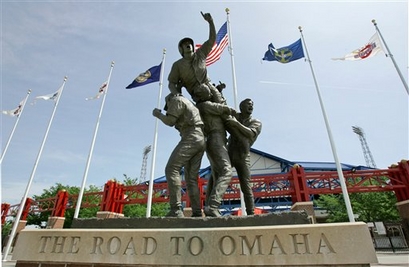OMAHA, Neb. - The College World Series will be played in Omaha at least through 2030, under an agreement the city and NCAA reached Wednesday.
 |
|
In this Wednesday, June 6, 2007 file photo, the Road to Omaha statue stands at the entrance to Rosenblatt Stadium, home of the College World Series in Omaha, Neb. The College World Series will be played in Omaha, at least through 2030 under an agreement the city and the NCAA reached on Wednesday, April 30, 2008. The city of Omaha and the National Collegiate Athletic Association have been discussing a long-term contract for months, with much of the discussion centered on the construction of a new downtown ballpark to replace 60-year-old Rosenblatt Stadium.
(AP Photo/Nati Harnik) |
A long-term contract has been in the works for months, with much of the discussion centered on the construction of a new downtown ballpark to replace 60-year-old Rosenblatt Stadium.
Plans for a stadium adjacent to the Qwest Center have been moving forward for weeks, and Wednesday’s “memorandum of understanding” promises a commitment of at least 20 years once the current contract expires in 2010.
“It’s a huge day,” Mayor Mike Fahey said. “We’ve been working very hard to get to this day.”
The Division I baseball championship has been held in Omaha every year since 1950. Omaha’s strong support for the event is a point of civic pride.
The CWS also is good for business, injecting an estimated $41 million into Omaha’s economy during last year’s 10-day run. The early summer tradition also gives the city national exposure on ESPN, which advertises its coverage as the “Road to Omaha” in the weeks leading to the CWS.
“Great day for the city of Omaha. Great day for the College World Series,” said Jack Diesing Jr., president of CWS Inc., the event’s local organizing group.
Though a number of cities have made inquiries to the NCAA about hosting the CWS, all did so with the understanding that the event was Omaha’s to lose. A succession of Omaha mayors have made it a priority to make sure that wouldn’t happen.
In February, Fahey and his stadium oversight committee unveiled plans for a 24,000-seat, $140 million stadium that would open in 2011.
Officially, the new agreement was between the NCAA and CWS Inc. But Fahey, who initiated conversation about a new stadium last fall and endured criticism from Rosenblatt supporters along the way, has been the point man in negotiations.
He met with NCAA officials in Indianapolis last week, and Wednesday’s announcement culminated two days of meetings in Omaha.
Fahey said he hoped a contract would be signed by June 10, four days before the start of this year’s CWS.
Taxpayers will be protected under the agreement, he said. Before any revenue is distributed to the NCAA, stadium construction debt and operating expenses and payments to a capital reserve fund must be covered.
“Not saying they aren’t going to be well-compensated,” Fahey said of the NCAA, “but the most important thing is that they recognize the citizens of Omaha are putting up a substantial amount of money along with the private sector here to get this done. They’re allowing us to take the first dollar out of this to make sure we pay the debt.”
The NCAA generated about $3.6 million in revenue from the CWS at Rosenblatt last year, not including television revenue.
Fahey said he couldn’t estimate how much revenue the CWS would generate in a new stadium, but it would be significantly higher because of stadium naming rights, suites and other fan amenities.
Ticket sales alone are projected at $5.5 million. “That’s just the start of it,” Fahey said.
The amount needed to cover debt, operating expenses and the capital reserve fund will be $2 million to $3 million annually, Fahey said.
“Suffice it to say, the amount of debt repayment will be amply covered,” Fahey said.
Dennis Poppe, NCAA managing director of football and baseball, did not return phone messages from The Associated Press. NCAA spokeswoman Stacey Osburn confirmed the agreement but had no additional comment.
The City Council still must approve several aspects of construction and infrastructure before the stadium plan is finished, but Fahey said it’s close to a done deal.
“It will be a much easier sell now that the debt payment has finally been structured,” he said.
Fahey said he’s hoping for an even longer deal, perhaps 25 years, by the time the contract is signed in June.
“We’re working on a couple little details yet,” he said.
Fahey spokesman Joe Gudenrath said the details concern issues about stadium financing and whether the construction bonds will require 20 or 25 years to pay off.
The length of the agreement is unprecedented for an NCAA championship and, Diesing said, the result of Omaha’s long and successful partnership with the organization.
Diesing said the final contract will include benchmarks that will allow Omaha to improve the event.
“Nothing is forever, but adding a 20-plus-year agreement to 59 years of history gets you within 20 years of 100 years,” Diesing said. “For players in college baseball, the road is going to be coming to Omaha for a long time into the future.”
On the Net:
National Collegiate Athletic Association: http://www.ncaasports.com
City of Omaha: http://www.ci.omaha.ne.us/
CWS Inc.: http://www.cwsomaha.com/

